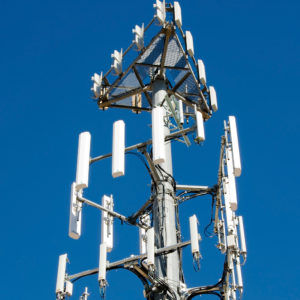Infrastructure is a hot topic these days as Congress considers ways to make multi-trillion dollar investments in areas of disrepair or to fund new projects. Notwithstanding what anyone thinks of these efforts, a critical infrastructure component has been excluded from the discussion: Telephone poles.
These poles, along with rights-of-way, are essential to bringing high-speed broadband to unserved Americans and offering new choices. Yet, current federal, state, and local policies are not enough to prod greater access to poles and rights-of-way by providers building broadband in unserved communities. Having been involved in these issues for over 25 years, I believe this needs fundamental attention so all Americans truly can participate in today’s digital society.
You may be asking how exactly can poles — those ugly, boring, burnt trees covered in wires — be so important? The answer is the wires carried on these poles connect consumers to various services, like power, telephone, cable, and broadband. Any provider seeking to bring communications services to an area via aerial installations versus burying the wires (if even possible) must get approval, pay to get the pole ready, including replacing poles, and then pay the pole owner the requisite rent. Therein lies a major problem. Essentially, certain pole owners can act as pirates guarding a port, deciding who, if anyone, gets to use their poles and what booty to extract in return. To put it in perspective, some owners have sought to get others to pay for new poles and imposed rates that are five or ten times above average.
For rights-of-way, these critical passageways can be vital to completing broadband network builds. If a provider needs to access a certain area in order to reach consumers, then it may need access to local rights-of-way owned or managed by a myriad of entities who often demand king’s ransom for access or delay approvals. Alternatively, the broadband company can try inefficient build-arounds, but that may be impossible or too expensive.
Free marketers may argue this is just natural supply and demand at work. But poles and rights-of-way are very far removed from a free market. In most communities, there is only one such provider given monopoly territory rights, bestowed favorable tax treatment, governed by strict rate regulation, and provided legacy ownership of key pole locations and rights-of-way: the local power company. This is especially true in more rural and less populated areas where the practices of some municipally owned electric utilities and electric cooperatives are blatant barriers to broadband deployment. Perversely, some claim they need to overcharge broadband providers to keep power rates low – a view likely not appreciated by citizens without broadband access.
Many of the same problematic companies on poles and rights-of-way are seeking to enter the broadband marketplace, asserting that existing broadband companies have failed to build sufficiently. Cue Alanis Morissette to sing “Ironic.” By seeking outrageous payments or just denying use of their poles or rights-of-way, these companies “justify” their broadband business ambitions.
There are simple fixes that would drastically improve the situation. Top of the list should be requiring all pole and rights-of-way managers, notwithstanding structure or size, to comply with federal law on the subject, which helps govern rates, replacement, and approval processes. Right now, many of those entities fall outside of these requirements. In the interim, individual states need to step to the plate, as Florida and others are looking to do, to enact strong state laws, comparable to the federal system. In addition, local governments should demand that their electric power companies make poles and rights-of-way available to broadband providers in a cost-efficient and timely manner. With new federal broadband money on the horizon, addressing pole replacement and access issues is needed to ensure taxpayer funds are used effectively. Moreover, let’s clarify that such funding can cover pole costs, minimizing any impact on electric and broadband consumers. In the end, all policymakers need to be engaged so local pole and rights-of-way managers do the right thing.
Almost everyone agrees that expanding and improving private sector broadband networks should be a priority. Making that happen, however, requires fixing pole attachment and right-of-way processes so that broadband providers actually can bring service to our neighbors missing out.

